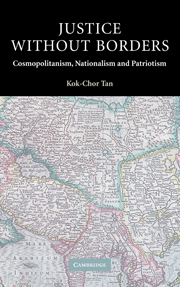2 - The need for cosmopolitan justice
Published online by Cambridge University Press: 22 September 2009
Summary
Introduction
The cosmopolitan idea of justice, as I am defending it, holds that distributive principles are not to be constrained or limited by state or national boundaries. In this chapter, I want to provide some reasons why we need a cosmopolitan conception of global distributive justice. I stress here both “justice” and “cosmopolitan” because I want to show both (a) why we need to talk about global justice as opposed to humanitarian assistance (and what is distinctive about the two), and (b) why global justice must be cosmopolitan in its conception.
My claims here will be largely familiar, I believe; but I think it is worth reminding ourselves of the relevance and importance of a cosmopolitan approach to global justice for the following reasons. First, some theorists argue, or at least give the impression, that we do not need principles of global distributive justice, but only principles of humanitarian assistance to tackle the problem of global poverty. Yet focusing on humanitarian duties as opposed to justice does not fully locate the source of global poverty, and hence falls short of offering a complete solution to it. Second, the surging interest in the theory of nationalism in recent political philosophy has brought on a renewed skepticism concerning the cosmopolitan ideal. Because nationalism and cosmopolitanism are often thought to be mutually incompatible ideals, the resurgence of nationalist claims in the world has put the cosmopolitan idea on the defensive.
- Type
- Chapter
- Information
- Justice without BordersCosmopolitanism, Nationalism, and Patriotism, pp. 19 - 39Publisher: Cambridge University PressPrint publication year: 2004



